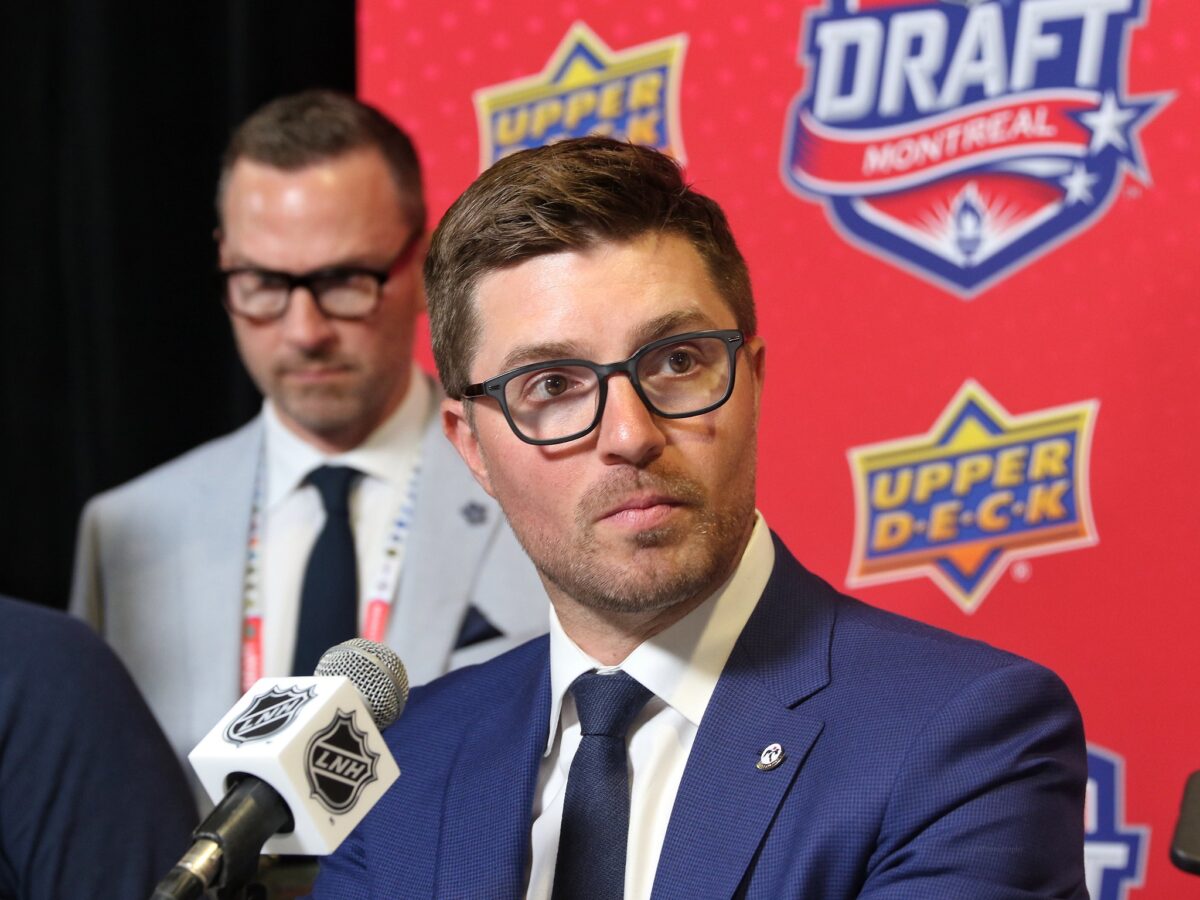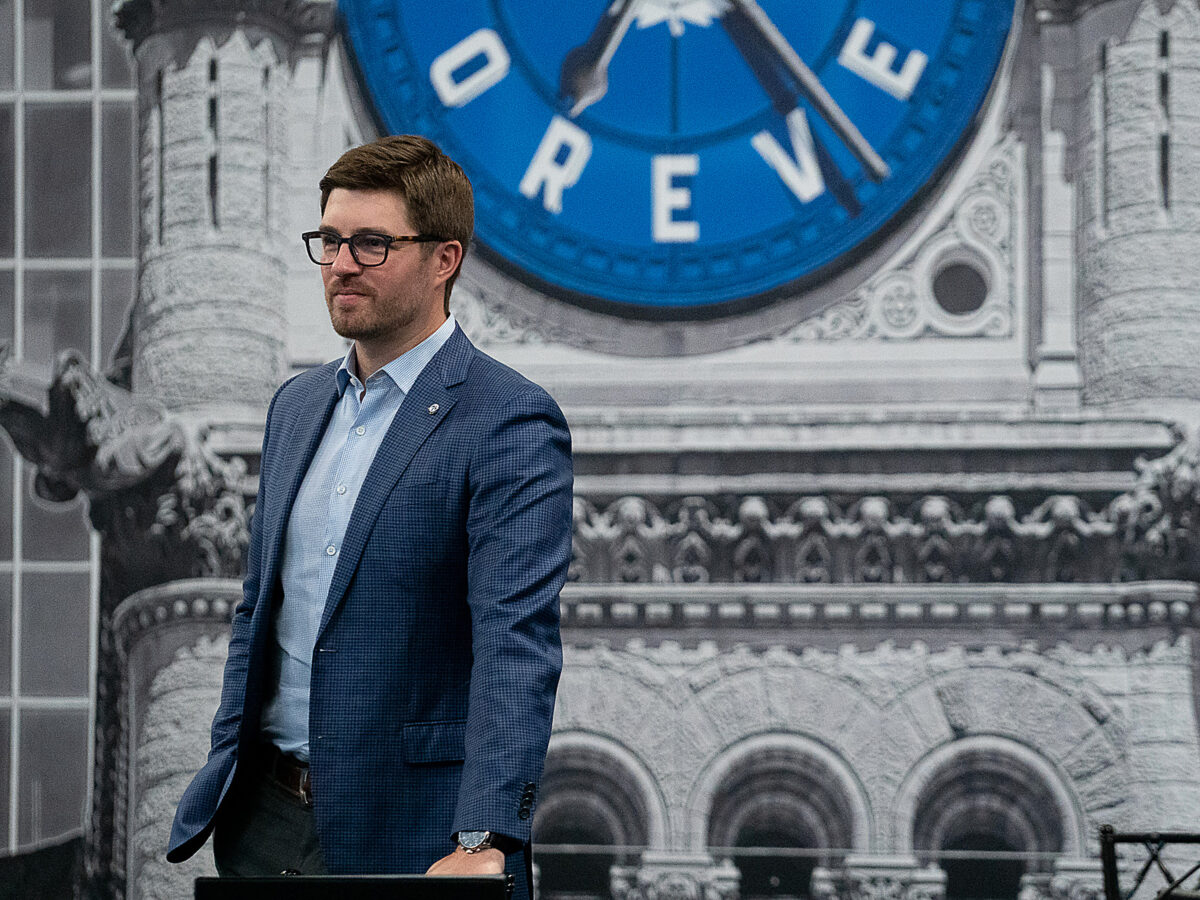Leafs’ nation seems to be evenly divided on their opinions of Toronto Maple Leafs’ General Manager Kyle Dubas. Those opinions seem to go to extremes. Dubas is either a genius and a trailblazer in how he builds a team and treats his players; or, he’s the joke of the league and hated by other teams GMs. There seems to be no middle ground.
Dubas Is a Good General Manager, Who Makes Mistakes
We have our tent set up in that middle ground. We think Dubas is a decent general manager. He has succeeded at the lower levels of the sport of hockey and has brought in some new ideas on how to go about doing the job. The process he uses for decision-making is logical and principled. He seems to respect his players. He keeps his cool in public and represents the organization well.
Related: Maple Leafs’ GM Kyle Dubas: Using Anger as a Negotiating Tactic
Without previous NHL experience, he’s also learning on the job. Has he made mistakes? Of course, he has.
There’s not a perfect general manager in the National Hockey League. No general manager has a crystal ball that accurately predicts the future. General managers can’t possibly know if a certain deal or a signing will work out as they hoped. What seemed like a good idea yesterday might not be such a good idea tomorrow.

We see Dubas as having made some very good decisions as the Maple Leafs’ general manager. In retrospect, we’ve also seen some not-so-good decisions made by him. Sometimes we wonder what he’s thinking and sometimes the logic reveals itself later. Or, sometimes it doesn’t.
The NHL’s Entry-Level Slide Rule
As the Sporting News reports, the NHL has what’s called an “entry-level slide.” It works like this: if a player signs his entry-level contract and is either 18 or 19 years old before September 15 of the signing year and does not play 10 games in the NHL that season, their entry-level contract is extended by one year.
Related: Frank Mahovlich: Highs & Lows of a Hall of Fame Career
There are some exceptions. If a player is 19 years old on September 15 of their signing year but turns 20 between September 16 and December 31, the contract does not slide. In addition, a player who is 18 on September 15 of their signing year may get to slide the contract for two years, unless they turn 19 between September 16 and December 31. Then it only slides for one year.
Dubas, Sandin, and the Entry-Level Slide Rule
One decision Dubas made in January 2020, about Rasmus Sandin, might now be coming back to haunt him and the organization.
About 18 months before this decision, at the 2018 NHL Entry Draft, Dubas made Sandin his very first draft pick as Maple Leafs’ general manager when he drafted him 29th overall in the first round. He then signed Sandin to a three-year ELC contract.

After a great showing in September’s training camp, Sandin joined the AHL Toronto Marlies. There he scored six goals and added 22 assists for 28 points in 44 games. Based on that success, Sandin quickly shot to the top of the Maple Leafs’ depth charts and became their #1 prospect.
Because Sandin did not play a single NHL game that season, Dubas was able to let his entry-level contract (ELC) “slide” for one more season. As shared earlier, ELC contracts are technically three years in length. But, if a player does not play more than nine games in the NHL in a season, a team can let his contract slide. That starts the three-year clock over again the following season. A team can do this twice, basically turning a three-year ELC contract into a five-year deal.
Related: The Sutter Family Has Deep Roots in Alberta Hockey
Dubas did exactly that with Timothy Liljegren. He let his ELC slide twice.
When Maple Leafs’ Injuries Hit, Dubas Relied on Sandin
After letting Sandin’s ELC slide once, the Maple Leafs used him in six NHL games in the fall of 2019 before sending him back to the Marlies. Had they left him in the AHL, the organization could have used the second contract slide to retain him on his ELC until the end of the 2022-23 season.
Unfortunately, the Maple Leafs ran into injury problems with their defensemen that season. Morgan Rielly was limited to 47 games, and Jake Muzzin to 53 games. Travis Dermott and Cody Ceci were limited to 56 games. The Maple Leafs had Martin Marincin as their seventh defenseman and used him for 26 games.

Those injury moves still left the team short. Rather than looking at other options, like trading for a replacement defenseman, on January 13th, 2020, Dubas called up Sandin. He was inserted into the lineup on January 14 in a 7-4 win over the New Jersey Devils. In that game, Sandin played 16:12 of ice time and scored two assists.
Sandin remained with the Maple Leafs for the rest of that season, playing a total of 28 games. That stretch used up the first year of his ELC contract.
Because Dubas Relied on Sandin, Sandin’s ELC Ended
Rather than using up that year of Sandin’s ELC, if Dubas would have left Sandin in the AHL and had gone another route, he could have let his contract slide one more season. Ironically, in the contract negotiations between Sandin’s agent and Dubas, it was Dubas’ choice that is allowing Sandin to be in a position to double his salary for the 2022-23 season. We’ve not heard that noted by anyone involved.
Related: Was Lou Lamoriello as Good as Toronto Maple Leafs Fans Remember?
Had Dubas made a different choice, Sandin would have had another year left on an ELC and would have earned $895,000 for the 2022-23 season. Had that happened, the organization would also not be engaged in the standoff we have between them, Sandin, and his agent Lewis Gross.
Ah, but for that Crystal Ball. Don’t you have to think this choice was one Dubas might have re-made in retrospect? To his credit, Dubas has to know what we just wrote. He’s just not saying.
[Note: I want to thank long-time Maple Leafs’ fan Stan Smith for collaborating with me on this post. Stan’s Facebook profile can be found here.]
